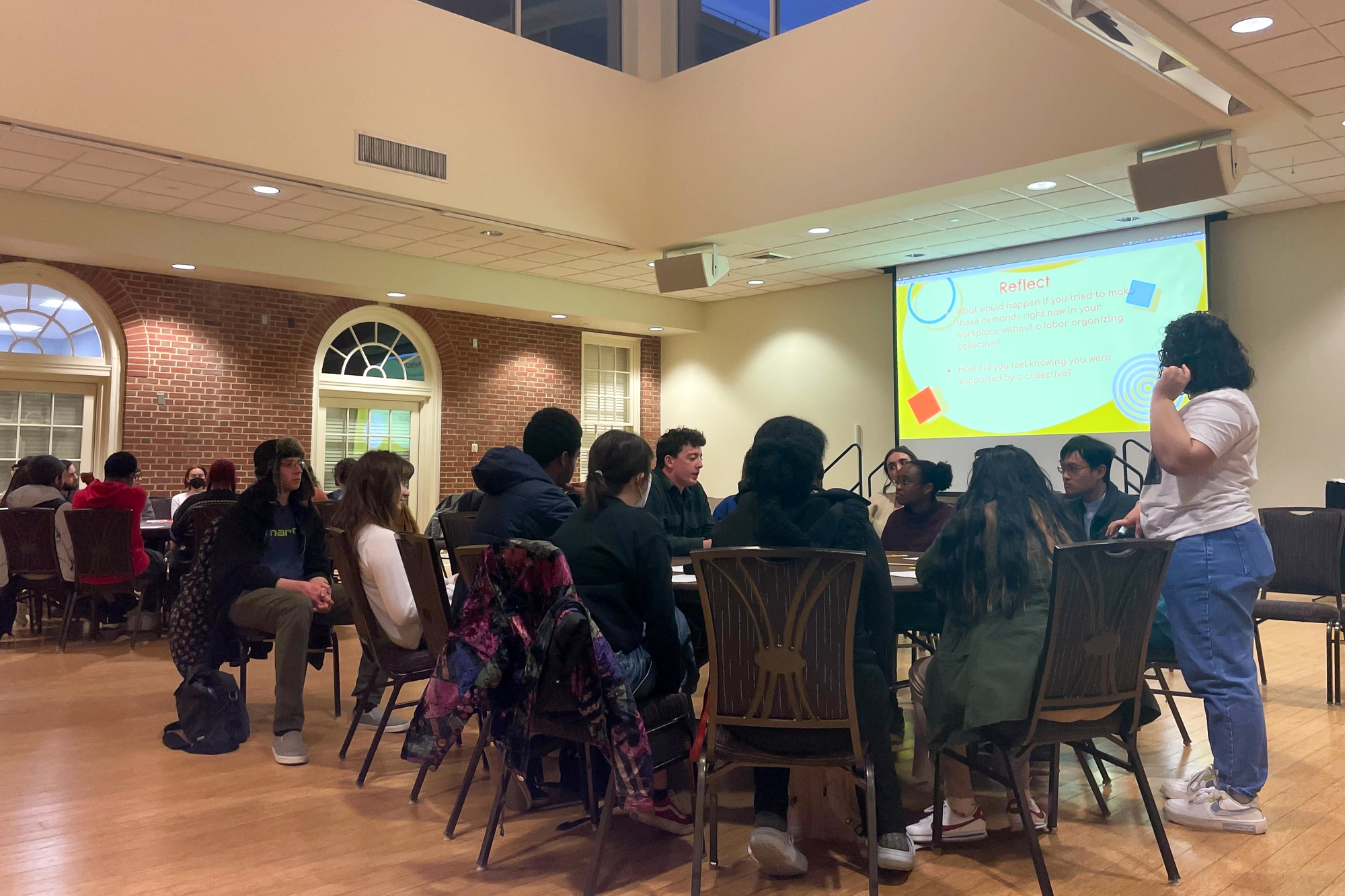In Stamp Student Union Tuesday, sophomore philosophy, politics and economics major Penelope Grenning recalled how her mother used to be homeless in a car and struggled to feed her siblings. After hearing about her mother’s experiences, working with dignity and having a livable wage became important issues to Grenning.
Grenning was one of about 35 University of Maryland community members who attended a worker power teach-in hosted Tuesday by this university’s chapter of labor rights organization United Students Against Sweatshops.
“It’s hard to have a stable job and have two kids when you’re homeless and jumping from house to house, especially with government cutbacks,” Grenning said.
The teach-in event, where Grenning and other students came together to discuss higher minimum wage and other worker demands, was part of Labor Spring 2023, an initiative launched by Georgetown University’s Kalmanovitz Initiative for Labor and the Working Poor that promotes nationwide worker justice teach-ins, events and actions. Labor Spring teach-ins are held across the country, from Massachusetts to Hawaii, according to Robyn Muncy, a Labor Spring national committee member and a history professor at this university.
[UMD faculty, graduate students testify on state collective bargaining bill]
Spreading awareness about the Time for 22 movement — a campaign that demands raising the minimum wage to $22.65, targeting this university — was the teach-in’s main purpose. The campaign also aims to secure the right to unionize for all workers at public universities in Maryland, according to Kelsey Coleman, the president of USAS Local 54 and a senior Black liberation studies and performing arts major.
The Maryland General Assembly voted in December 2021 to allow for a consolidated bargaining agreement for all employees at all USM universities. USAS is advocating to extend unionization rights to all workers at state universities.
“We are the workers. We are people,” Coleman said. “We run this campus, so we will fight for democracy.”
Attendees also engaged in a unionization simulation to mimic gathering and making worker demands to a university. Muncy does not know of any other teach-in that has done a unionization simulation, she said.
“I think a union can really restore not only our rights, but the dignity of working people,” sophomore history major Richard McKeon said.
[Maryland General Assembly advances Wes Moore’s policy priorities as bill deadlines near]
After successfully fighting to make the minimum wage for employees at this university $15 per hour in its Pay Up Pines campaign in 2021, USAS shifted its focus to advocating for an increase to $22.65 per hour. This amount is the living wage for a single adult living in Prince George’s County without dependents, according to the MIT Living Wage Calculator.
“You have to pay for food, gas, books, all these different things to live and in order to be a student,” Coleman said. “Especially with inflation going on right now, everything is just so expensive.”
Many resident assistants, community assistants and teaching assistants at this university do not have leeway with working conditions and pay, McKeon said.
Senior public health science major Vivian Flanagan said they hoped the teach-in spread awareness of the opportunities that come with unionization.
“As of right now … a lot of folks are unionizing, like Starbucks, Amazon, Apple,” Flanagan said. “We realized most of our members are undergrads … so why not just expose that to them?”
CLARIFICATIONS: Labor Spring was launched by Georgetown University’s Kalmanovitz Initiative for Labor and the Working Poor in collaboration with members of other organizations and campuses. USAS Local 54’s campaign to increase the minimum wage to $22.65 only targets this university. USAS is advocating to extend unionization rights to all workers at state universities, not just faculty or students. This story has been updated to clarify these matters.
CORRECTION: A previous version of this story misstated that the Maryland General Assembly voted in December 2021 to give union employees at USM institutions collective bargaining rights. The legislation allowed for a consolidated agreement for those who already had collective bargaining rights. This story has been updated.



